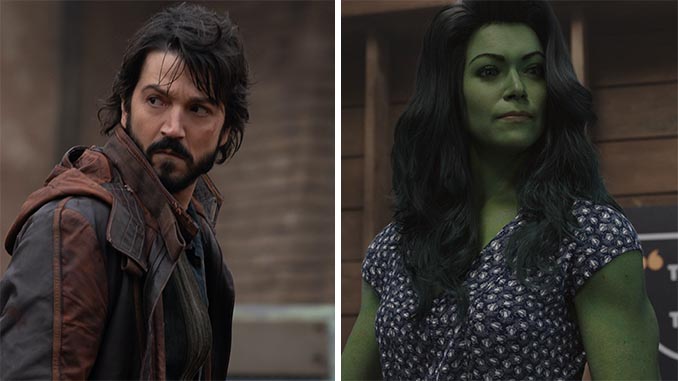As Fun as It’s Been, It’s Time for Disney+ to Branch Out from Marvel and Star Wars
Photos Courtesy of Disney+
Netflix’s subscriber base is shrinking. HBO Max is silently and not-so-silently removing titles from its platform. Apple TV+ has an Emmy-winning comedy that’s reportedly a mess behind the scenes. And yet, none of them are in a rut quite like Disney+.
Launched in late 2019 on the back of The Mandalorian and High School Musical: The Musical: The Series, properties based on popular intellectual property owned by the Walt Disney Company, the streaming service had it easier than most. With the exception of perhaps HBO Max, which at the time of its launch was the streaming arm of Warner Media (now Warner Bros. Discovery) and benefited from the recognition of the HBO brand, most platforms have had to work diligently to first build and then maintain loyal audiences. But Disney+ came out of the gate swinging, primed for maximum viewer interest thanks to its considerable library of existing titles from the Disney vault as well as exciting new content from two of the biggest cinematic franchises in history: Marvel and Star Wars. But nearly three years removed from launch, Disney+’s identity is still intrinsically linked to these mega universes and the numerous shows they’ve spawned. One has to wonder: How long can this continue? How long can the company, which is experiencing slowed subscriber growth, rely predominantly on Marvel and Star Wars content to feed the hungry maw of its current subscribers, let alone bring in new ones?
Of the 19 original live-action series that have been released to date, seven are an extension of the Marvel Cinematic Universe. WandaVision, The Falcon and The Winter Soldier, Loki, and Hawkeye all debuted in 2021 and followed supporting characters from the uber-popular feature film series in adventures that saw them finally step into the spotlight. It was brilliant from a business standpoint because fans were already emotionally invested in the characters and would no doubt follow them to the small screen, regardless of story quality. So it allowed MCU mastermind Kevin Feige to further explore fan-favorite, multi-layered characters like Wanda Maximoff (Elizabeth Olsen) and Loki (Tom Hiddleston) in an extended format while simultaneously introducing the next generation of heroes and moving pieces around the proverbial chessboard so that characters were where they needed to be for the next big film (see: Wanda as Scarlet Witch in Doctor Strange in the Multiverse of Madness).
The three series to debut in 2022—Moon Knight, Ms. Marvel, and She-Hulk: Attorney at Law—have introduced us to additional members of the next generation while also branching out into new and different genres. The exceptionally fun Ms. Marvel features only the second coming-of-age story in the MCU after Tom Holland’s stint as Peter Parker, while She-Hulk is an out-there comedy masquerading as a legal procedural as it revels in poking fun at the extended Marvel universe.
Not every show has lived up to expectations or been successful creatively though—it’s basically WandaVision and then everyone else (though they all have their moments)—but the same can be said about the service’s four new entries into the Star Wars lexicon too. After The Mandalorian, which has two seasons under its belt with a third set for early 2023, Disney+ released the dreadfully boring The Book of Boba Fett. It followed that up with two more legacy shows: Obi-Wan Kenobi, which saw Ewan McGregor reprise the eponymous role opposite Hayden Christensen’s Darth Vader, and Andor, which stars Diego Luna as Cassian Andor and serves as a prequel to the impressive stand-alone film Rogue One. Of all the Star Wars series, only the latter has truly lived up to the immense hype surrounding it. Like The Mandalorian, it features a (relatively) new character in Star Wars lore who is just mysterious and intriguing enough to warrant his own series and stoke our collective interest. Set five years before the deadly events of Rogue One, it doesn’t feel like much else in the Star Wars universe, which means it is exactly the type of storytelling that might just reenergize the Star Wars universe.
-

-

-

-

-

-

-

-

-

-

-

-

-

-

-

-

-

-

-

-

-

-

-

-

-

-

-

-

-

-

-

-

-

-

-

-

-

-

-

-








































